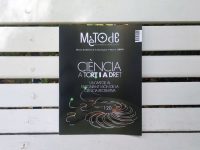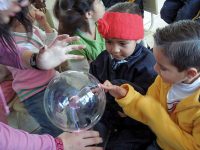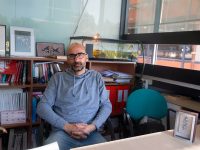|
Jordi Costa is in New York, but he still has a moment for us. After exchanging several emails, he answers our questions, apologising for not being able to write diacritical marks, with the justification that his keyboard is set to English. He’s young, not over thirty years of age, and has already earned a PhD in Neuroscience from the University of Barcelona, and works as a researcher at the Laboratory for Cognitive Neuroscience and Neuroimaging at the Nathan Kline Institute for Psychiatric Research in New York. His research focuses on the study of auditory regularity encoding. He tells us proudly that he is an amateur guitarist, and his passion for music has always inspired his passion for auditory neuroscience.
Steven Mithen argues that music has been incorporated into the human genome during the evolution of our species. In this sense, could we say that we have an innate musical competence?
While it is difficult to confirm that we have an innate musical competence encoded in our genome, the fact is that we have a number of mechanisms in our auditory and motor systems that allow us to perceive and create music. This, as a human product, has similar characteristics to how we think our brain works, which is like a mirror: the rhythmic fluctuation of acoustic energy in music and electrical energy in the brain, the hierarchical organisation in complex structures, the encoding and violation of regularities; etc. There are, however, people who go further and propose that music could have been the way our ancestors communicated. Anyway, it is very difficult to think in purely genetic terms when it comes to such complex activities as music…
Is music a gym for the mind?
Of course! Learning music is one of the most powerful activities that can produce changes in the brain (plasticity). It refines our auditory system and sharpens tone discrimination; it improves memory in complex melodic and rhythmic structures; it improves motor skills and coordination; creativity; attention; social skills…
Is there a separation in the brain between linguistic and musical ability? Because it has been proved that musical ability may exist within the brain even if language is not present…
Music and language share many brain structures and functions. But there are cases of neurological patients (and at this point I recommend everyone reads Musicophilia by Oliver Sacks), cases that seem like science fiction, in which we have examples of people who, despite preserving language, are born without – or lose after a neurological accident – the ability to perceive or produce melodies or rhythms, or both. Or cases of people who lose language skills but preserve melodic and rhythmic skills. However, a comprehensive and controlled study is very difficult due to the etiology posed by each case.
Your team has held neuroconcerts in Barcelona. What conclusions have you drawn from this experience?
Neuroconcerts are part of a playful popular science initiative in which, through live music, we bring the general public closer to concepts such as the ones we’ve been discussing so far. We designed nine different activities ranging from medical therapy using music to differences in music between the East and the West, including music and advertising and music and child development. The overall experience has been very positive for us, a necessary effort to adjust the level of our explanations and scientific findings to the general public, and put them into a broader context. When you work in science, you often lose track of the big picture, because you focus more and more on more specific problems, so when you explain them to a person on the street you have to put them into context, you have to think big, you must make an effort to which you are not used to and it’s very rewarding. In fact, it is often more difficult to answer questions from the general public than from a specialist audience! Moreover, as we had live music, musicians have also benefited from it because we have helped them to understand phenomena that they experience every day: why do they have to play like this? what happens when they improvise? or why do they feel like they do when they play? Finally, I think that it is also a very good experience for the general public because they learn something interesting while enjoying live music. I do not know if we will have many opportunities to hold more concerts, because we’re short on budget! But I hope that, even in smaller spaces and perhaps in less «professional» environments, we can continue the spirit we have launched and that has been so satisfying.
A question many people ask themselves is what degree of truth there is in the so-called «Mozart Effect». Can we get smarter by listening to him?
If I have to be honest, I’m not very sure about the Mozart Effect… It is based on old, uncontrolled studies, and as often happens in science, a result like «listening to Mozart rather than silence before performing a visuospatial task improves outcomes during the first 15 minutes of the task» leads journalists to conclude that «listening to Mozart makes you smarter». Journalists must be more careful! I don’t doubt that listening and rehearsing music enhances many of our cognitive, emotional and social skills, but Mozart in particular… I prefer Bach… and Hendrix.
The evolutionary psychologist Robin Dunbar argues that community musical activity makes us feel better because it triggers waves of endorphins in the brain. Therefore, could we consider music a social glue?
Music does definitely act as social glue. It is a vehicle for global communication. Without lyrics, everyone can understand music (excluding neurological patients! and taking into account the fact that music can be substantially different between cultures). But if you also add text, and if it is a socially and politically committed text, you have entire generations singing hymns against wars and dictatorships.
In short, how would you define music from the point of view of neuroscience?
One of the greatest gifts we can give to our brain. An experience that changes it, making it work better, making us smarter, more responsive and more… human. It’s a shame that it is so underrated in our country. In other countries, learning music in school is as important as learning math or literature.
Teresa Ciges. Journalist (Valencia).
© Mètode 2014.
|
|
«Music, as a human product, has similar characteristics to how we think our brain works»
«Learning music is one of the most powerful activities that can produce changes in the brain (plasticity)»
«If you also add text to the music, and if it is a socially and politically committed text, you have entire generations singing hymns against wars and dictatorships»
«It’s a shame that it is so underrated in our country. In other countries, learning music in school is as important as learning math or literature»
|

 Teresa Ciges
Teresa Ciges




